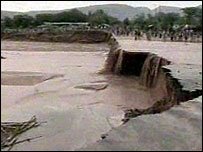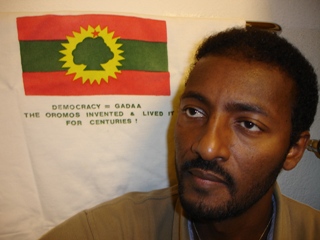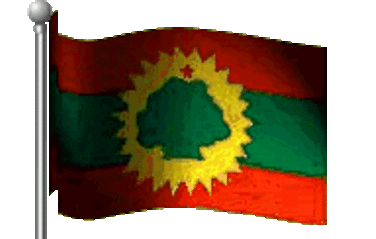At the 12th Session of the Working Group on Minorities, held in Geneva from 8 until 11 August 2006, an Oromo human rights defender brought attention to the current situation of the Oromo, calling for the right to self-determination of the Oromo people to be implemented and respected.´
Sub-Commission on the Promotion and Protection of Human Rights, Working Group on Minorities 12th Session, August 8 - 11, 2006, Geneva, Switzerland. Thank you distinguished chairperson for giving me an opportunity to introduce to the Working Group the situation of the Oromo people in Ethiopia and their plight.
Ladies and Gentlemen The Oromo people represent the largest national group in the country accounting about 35 million people out of the total 75 million people of the total population of Ethiopia. They are considered as one of the indigenous peoples inhabiting the Horn of Africa.
Despite their numeric majority, the Oromo people are in a minority-like situation in the country. Since the colonization by the Abyssinians, at the end of 19th century, the political, economical social and cultural life of the Oromo people in the Ethiopia has been marked by discrimination and marginalisation. The egalitarian and democratic institution of governance of the Oromo people, known as the Gada system, their belief in one God- Waaqa-, their cultural and language were banned; their means of subsistence including their traditional land were confiscated and the people were reduced to serfs and slaves. Since then, the situation of the Oromo people has been worsening under the various successive regimes in the country.
The current Tigrean People’s Liberation Front (TPLF) has reportedly continued the subversive autocratic rule of Oromia in the name of the national territorial integrity of the Empire. It allegedly musters total control of all government machineries, the judiciary, the army, and the press. Attacks and harassment against the Oromo people continue allegedly by the security forces perpetuating the fears of the people in Oromia and other southern parts of Ethiopia. Human rights violations such as cases of arbitrary detention and extrajudicial killings are constantly reported by the people. Furthermore, the Oromo people, as well as other nations and nationalities in the southern belt of the Empire, reportedly face forced evictions and resettlement, growing epidemic diseases, extreme poverty and skewed educational programmes.
Since the TPLF/EPRDF regime came to power in 1991, systematic repression has been reported against Oromo people resulting in untold sufferings in the whole of Oromia, particularly in the countryside far from the sight of the international community. The government reportedly subjects often its critics to harassment, extrajudicial killings, imprisonment and torture. As a result countless Oromos languish in detention camps and prisons in the country. In 2005, over 25, 000 people were in prison throughout Oromia and Finfinne (Addis Ababa). This number, if anything, has grown ever since as a result of the repeated unrest following peaceful demonstrations.
Intellectuals, students, teachers, journalists, aid agency workers, artists, human rights activists and peasant farmers are particularly targeted solely on the basis of their origin. Children are as well reportedly subject to harassment and abuses. Accordingly renowned international Human Rights Organisations believe that the Ethiopian authorities are guilty of racism.
Mr. Chairperson, aloud me to provide some examples.
The Macca and Tulama self-help Association (MTA), Oromo high school and university students, civic organisations, farmers and journalists peacefully protested against deforestation, skewed taxes, exorbitant rise in the price of fertilizers, educational policies, change of the capital city of Oromia from Finfinne (Addis Ababa) to Adama etc were met with heavy handed forces of the security and police who acted with impunity. At the moment of finalization of the present statement, all detained in connection with the mentioned protests were still detained in different prisons. According to reports, some of the protesters died allegedly as a result of torture. Some were denied medical treatment and died. And still more are suffering from diseases related to poor conditions in the prison. Those who managed to run away are suffering as refugees in the neighbouring countries. Related to these incidents over 350 University students were dismissed from classes and some were thrown into to the jails in 2004. Two of these Gaddissa Hirpassa and Alemayehu Gerba were killed from torture and live bullet in the Kallitti prison.
The leaders of MTA Dirribi Demissie, Gemechu Feyera, Sintayehu Workneh and Ayelu Ittisa and more than a dozen of Oromo university students and journalists Shiferaw Insarmu and Dhabasa Wakjira are still in custody even though different benches of court ordered their release on several occasions. Amnesty International and other human rights organisations consider them as prisoners of conscience and appealed for their release since 2004.
These peaceful demands of students and farmers continued in May 2006 in the high schools and universities across Oromia. Following the incident, 22 farmers were massacred in Horro Guduru in February of this year, dozens of students were killed and wounded from live bullet from security forces, several thousands of Oromo nationals were kidnapped and detained in different prisons in Oromia state and Finfinne (Addis Ababa). Students like Jagama Badhane and Kabada Badhasse were killed just in front of their school in town of Ambo. Events coming from different Universities, report that graduates of Oromo origin, in particular from Makalle University, are denied of their certificates after completion of their studies.
The Government is reported to contrive the conflicts in neighbouring Borana and Gujji Oromos led to the internally displaced persons of over 100, 000 people and over 135 deaths. Similarly, in August 2005, 73 people were killed and more than 85,000 flee their homes from villages in Miesso in West Hararge region of Oromia. Most of them remain displaced without proper attention and support.
Uncompensated evictions of Oromo farmers from their ancestral land in Oromia, particularly around Finfine (Addis Ababa) and other cities in Oromia have reportedly reached untold proportions. In the name of investment, the Government has systematically uprooted farmers from their ancestral lands without due compensation and turned thousands of farmers landless and victims of ecological degradation and hazardous health problems emanating from the new agglomerations. The expansion of flower farms has aggravated the situation around Finfinne (Addis Ababa.)
Control over fertilizer and agricultural inputs and credits in particular have given the government an effective tool for quashing dissent in rural parts of Oromia. A TPLF owned company in charge of importing fertilizers systematically regulates distribution and price of fertilizer and other agricultural inputs. Farmers are forced to pay exorbitant prices that do not often compare their income. Those who as a consequence fail to pay are thrown into the prison and finally were forced to auction off livestock or household goods to get out of prison. This is in a stark contrast to the hypocritic claim that the government of Ethiopia boast to achieve food security.
Recommendations.
Macca and Tulama association leaders, journalists, teachers, students, farmers and other thousands of Oromo citizens arrested should be released immediately and unconditionally,
• Those responsible for the extra judicial killings, torture and severe beatings in different schools around Oromia should be brought to justice.
• The right to association, freedom of expression, education and the right of the Oromo to Waqeffanna as a religion should be respected and the investigation through concerned special rapporteurs should be conducted,
• The right to self-determination of the Oromo people should be implemented and respected.
Thank you for your attention Intervention.
by, Tarekegn Chimdi
Source
UN Working Group on Minorities

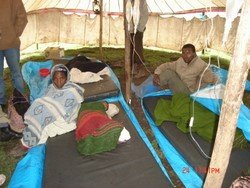

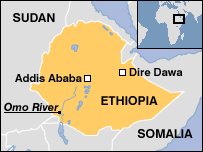
 By Staff
By Staff